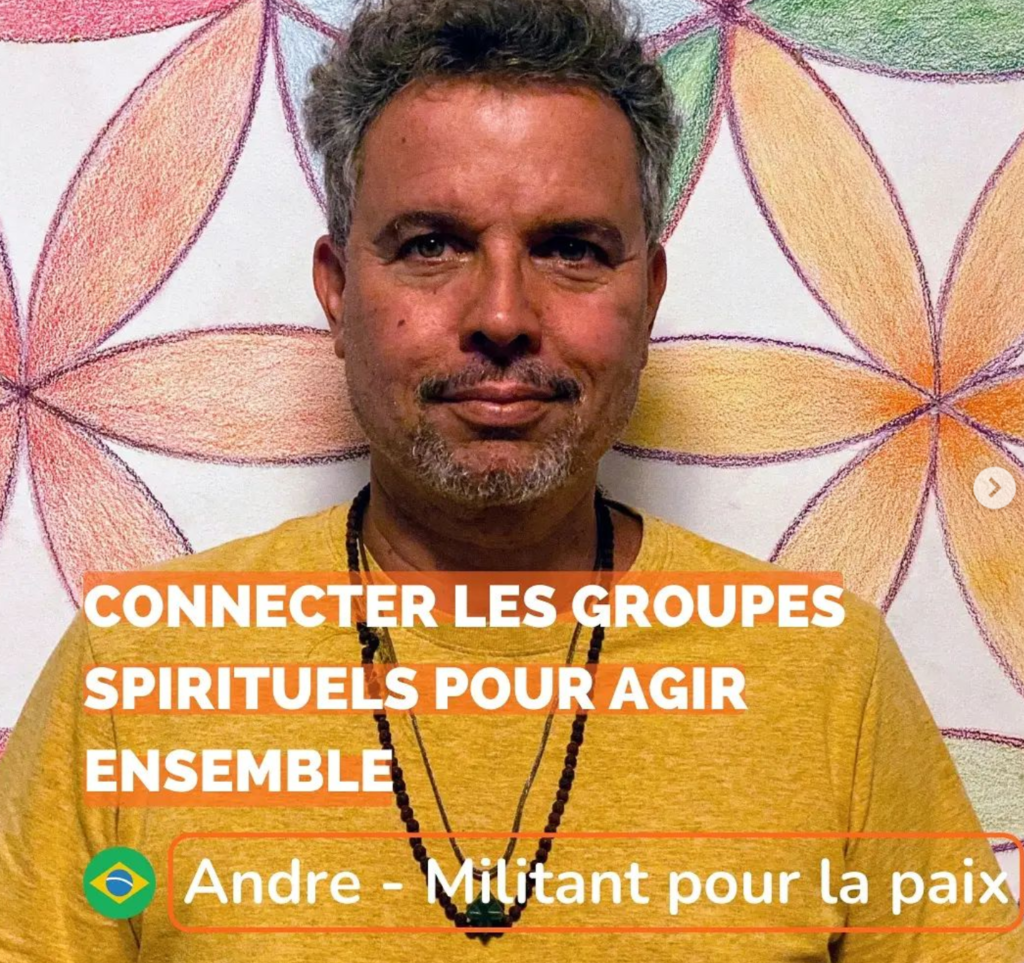Portrait d’un acteur de paix
🇫🇷 Nous avons commencé nos entretiens au Brésil avec Andre, qui a participé à la création du premier Mouvement Interreligieux de Rio (MIR) et a été coordinateur pour United Religions Initiative (URI) de la région Amérique latine et Caraïbes. À travers son parcours, il nous a dessiné la chronologie de l’évolution du contexte interreligieux au Brésil depuis le Sommet de Rio pour la Terre (United Nations Conférence des Nations Unies pour l’Environnement et le Développement) en 1992. Andre s’est intéressé très tôt à la spiritualité alors que ses parents n’était pas du tout religieux. À 16 ans, il s’est initié au shivaïsme. Pour lui, tout le monde a un sens sacré de la Nature au Brésil car le pays est imprégné de spiritualités, de part les racines des peuples autochtones et de son héritage des populations afro-descendantes. Pendant 17 ans au sein de URI, MIR et Viva Rio, Andre connecte les groupes religieux autour de causes communes comme la lutte contre les violences ou l’environnement, voyage dans plus de 35 pays et noue des amitiés dans une centaine de pays. Aujourd’hui, il est reconnu en tant qu’astrologue et aide les personnes à mieux se connaître elles-mêmes.

“Pendant la dictature militaire, les religions ne s’occupaient que de religion et pas du travail social. La théologie de la libération de Leonardo Boff dans le catholicisme a commencé à changer ça.”
Son action
Rio est une ville unique où les pauvres et les riches y vivent très près les uns des autres.” C’est ce constat de mixité à la fois sociale et interconvictionnelle qui a mené à la création du Mouvement Interreligieux de Rio (MIR) où était engagé Andre. De ses différentes expériences interconvictionnelles, Andre tire 2 enseignements :
1️⃣ Gardez des traces, cartographiez les ressources et les activités, recensez ce qui a été fait, faites une photographie de la situation à l’instant T : pour séduire les gens et les convaincre de faire des efforts, vous devez leur faire voir ce qui existe et que ça marche. Il faut qu’ils se disent “Je ne peux pas ne pas en être aussi, il faut que j’en sois.”, faites-en une priorité.
2️⃣ Sachez faire confiance, une confiance pleine et entière. Une confiance mutuelle profonde est la clé.
Pour lui, l’interconvictionnel est l’interface entre les religions et la citoyenneté.
🌎🧡 Ses deux conseils ont fait profondément écho pour nous au programme InterFaith Tour que nous portons : à la fois recenser les initiatives interreligieuses et interconvictionnelles qui marchent sur une “carte de la paix” pour donner envie de passer à l’action et vivre en équipe la confiance à tous les niveaux !
Ses anecdotes et sa vision du féminisme
Pendant notre entretien, Andre nous a partagé plusieurs anecdotes de ses 17 années d’engagement, notamment sa rencontre avec Schlomo, juif israëlien, au Parlement Mondial des Religions à Jérusalem lors d’une conférence sur l’eau. “I find sexism is the root cause of all problems of humanity. Sexism is the true Pandora box. Sexism is destroying everything.”
« Je trouve que le sexisme est la cause profonde de tous les problèmes de l’humanité. Le sexisme est la véritable boîte de Pandore. Le sexisme détruit tout. »
Quand on lui a demandé sa vision du rôle des femmes dans l’interconvictionnel et les processus de paix, il s’est dit féministe et qu’il y a des qualités dans le dialogue et l’écoute attribuées aux femmes qui peuvent être des stéréotypes. S’il a l’impression que ce n’était pas vraiment un sujet auparavant, Andre observe un changement ces dernières années depuis #MeToo.Pour lui, le leadership et l’empowerment des femmes sont une clé essentielle mais il est devenu pessimiste : “Tous les jours dans mes sessions d’astrologie, je vois combien le sexisme fait du mal, même à des femmes de pouvoir.” Le sexisme est très présent au Brésil et continue d’être véhiculé notamment dans le cadre religieux.
———-
🇬🇧 We began our interviews in Brazil with Andre, who participated in the creation of the first Interreligious Movement of Rio (MIR) and was the coordinator for the United Religions Initiative (URI) for the Latin America and Caribbean region. Through his path, he gave us a chronology of the evolution of the interreligious context in Brazil since the Rio Earth Summit (United Nations Conference on Environment and Development) in 1992. Andre became interested in spirituality at an early age, even though his parents were not religious at all. At the age of 16, he was initiated into Shivaism. For him, everyone has a sacred sense of Nature in Brazil because the country is steeped in spirituality, due to the roots of the indigenous peoples and its heritage of Afro-descendant populations.
“During the military dictatorship, religions were only concerned with religion and not with social work. Leonardo Boff’s liberation theology in Catholicism began to change that.”
During 17 years with URI, MIR and Viva Rio, Andre connected religious groups around common causes such as the fight against violence or the environment, traveled to more than 35 countries and built friendships in 100 countries. Today, he is recognized as an astrologer and helps people to know themselves better.
🇺🇲 During our interview, Andre shared several anecdotes from his 17 years of involvement, including his meeting with Schlomo, an Israeli Jew, at the World Parliament of Religions in Jerusalem during a conference on water.
“I find sexism is the root cause of all problems of humanity. Sexism is the true Pandora box. Sexism is destroying everything.”
When asked about his view of the role of women in interfaith and peace processes, he said he is a feminist and that there are qualities in dialogue and listening attributed to women that can be stereotypes. While he feels like it wasn’t really a topic before, Andre sees a shift in recent years since #MeToo.
For him, women’s leadership and empowerment is a key, but he has become pessimistic: « Every day in my astrology sessions, I see how much sexism hurts, even women of power. »
Sexism is very present in Brazil and continues to be conveyed in religious settings.
.
#Brazil #RioDeJaneiro #Brésil #peace #social #faithforgood #agirensemble
#diversity #worldtour #interfaith #peaceactivist #faith #united #belief #peacemaker
#spirituality #shivaism #astrology #inclusion #religion #conviction #IFT5 #interfaithtour
#paix #diversité #tourdumonde #interreligieux #interconvictionnel #aventure

